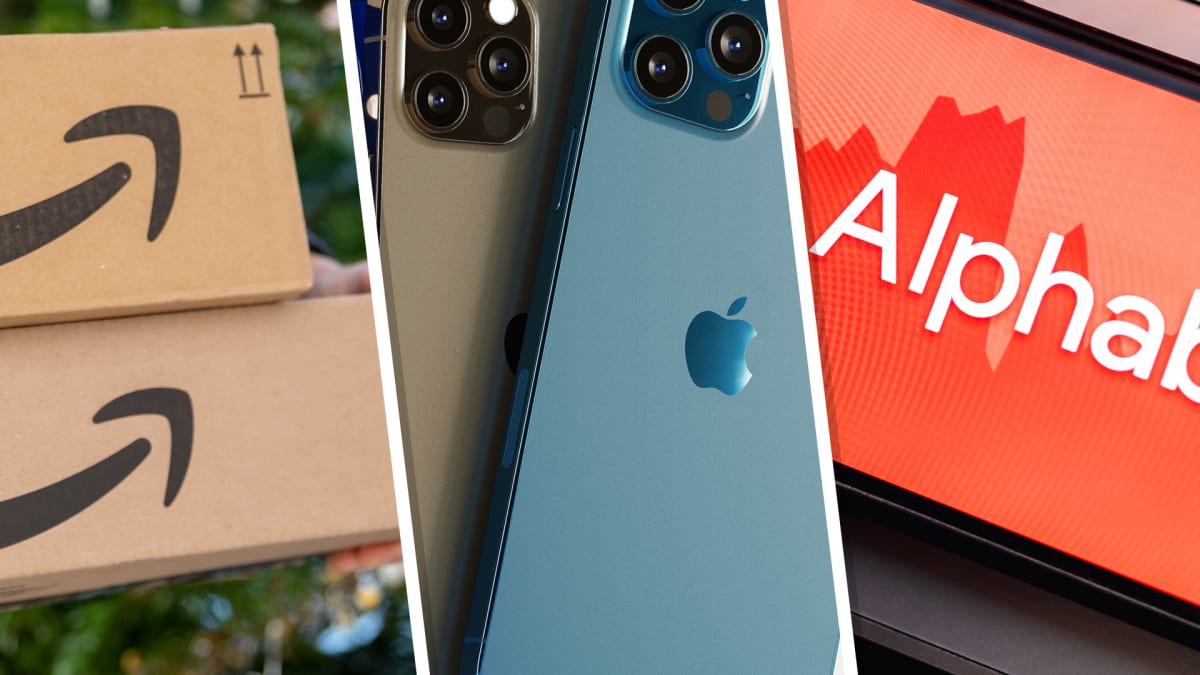
Big Tech earnings could test the Nasdaq's strongest January rally in more than a decade this week, as updates from the benchmark's most influential companies fine-tune the sector's increasingly cautious outlook while testing market reaction to a slew of layoffs and cost cuts.
With ad spending in decline, business investment in cloud computing in retreat and consumer demand for everything from smartphones to personal computes on the wane, tech companies have been moving quickly to shed costs and manage muted earnings expectations.
Tech layoffs, in fact, have front-run the job market for much of the past few months, including 58,000 layoffs in January alone, as stalwarts such as Google parent Alphabet (GOOGL), Microsoft (MSFT), Intel (INTC) and Salesforce (CRM) cull staff in the face of slumping demand and increasing cost pressures.
Google, Microsoft, Amazon Slash Workforces
Google CEO Sundar Pichai said his company's plans to cut around 12,000 jobs from its global workforce gave the group a chance to "sharpen our focus, reengineer our cost base, and direct our talent and capital to our highest priorities."
Microsoft's Satya Nadella, meanwhile, told investors that "just as we saw customers accelerate their digital spend during the pandemic, we are now seeing them optimize that spend," adding that "organizations are also exercising caution given the macroeconomic uncertainty."
Amazon, the second-largest U.S. employer behind Walmart with a global workforce of around 1.6 million, said the decision to slash around 17,000 jobs had been "more difficult given the uncertain economy and that we’ve hired rapidly over the last several years", a view echoed by Salesforce (CRM) CEO Marc Benioff when he detailed headcount reductions of around 10% of its 56,600-strong workforce at the enterprise software group in early January.
Still, markets were swift to reward the job cut moves with higher stock prices, which were also helped by lower Treasury bond yields and the rebound from tax-loss selling over the final weeks of last year, to record big year-to-date gains that have lifted the Nasdaq more than 9.4% to its best January gain since 2001.
"Tech stocks have fallen pretty far down on the list of (investor) concerns,” Bank of America strategists said in a weekend note, with big names "trading barely down on terrible misses, up on in-line, and ripping on beats.
"The action is telling us something," BofA said, adding that "retail investors are buying again, another proof point that consumers actually have money.”
Apple shares are up 12.3% so far this year, while Google has gained 12.6%. Amazon and Meta have been even more impressive, rising 21.7% and 26.1% respectively. Salesforce is up 24.7%.
Tesla (TSLA), a carmaker frequently grouped with the tech space, had its best five-day run since 2013 last week, rising 33% despite forecasting narrowing profit margins and increasing input costs alongside its fourth quarter earnings beat.
"Job cuts at many tech companies so far this year are a positive for their stock prices, but these companies have a long way to go to rectify the poor governance and culture created by the Federal Reserve-induced era of easy money," said David Trainer, CEO of Nashville-based investment research group New Constructs.
"We expect the stock market to be more discerning as it awards the stronger companies with more value, while sending the stocks of weaker companies lower, a dynamic that sounds simple, but didn't occur in 2020 and 2021," he added.
Meta will kick off the Big Four earnings with its December quarter update after the close of trading on Wednesday, although Snap Inc.'s (SNAP) fourth quarter earnings on Tuesday, and its outlook for ad spending, has become an increasingly important precursor for the sector.
Meta is expected to post a bottom line of $2.22 per share, down 40% from last year, on revenue of $30.8 billion. Snap is likely to see revenues edge 0.4% higher from last year to $1.303 billion.
Analyst Ives: 'Tech Super Bowl' of Earnings
A triple set of earnings after the bell Thursday, including Apple, Amazon and Google, will round out what Wedbush analyst Dan Ives has described as the 'Tech Super Bowl' of earnings.
"The most important (of the four updates) for the market will be Apple's, which will give a glimpse into the overall demand story for consumers globally while giving a snapshot of the China supply chain issues starting to slowly abates ... (and) ... the Street laser focused on Cook's commentary for the March/June quarters," Ives said.
"In our opinion Cupertino will likely be more prudent around its guidance for the March quarter which is the smart move with the Street already dialing down growth expectations and much bad news baked into the stock," he added.
Apple is expected to see its bottom line fall 7.6% to $1.94 per share, with revenues in the region of $121.1 billion.
Trainer of New Constructs sees Amazon cautions that Amazon's fourth quarter cash flows, while supported by holiday spending, will likely remain negative and its earnings per share can often be affected by investments in companies -- such as Rivian Automotive (RIVN) -- that aren't related to its core business.
Even with Amazon's move to slash 10,000 jobs, surging costs are likely to bite deeply into its bottom line, with analysts expecting a big decline in fourth quarter earnings to 17 cents per share, even as revenues rise 53% to $109.6 billion.
For the opposite reason, Trainer likes Google's "super high cash flow, cheap valuation and proven track record of innovation"
Google is forecast to post fourth quarter earnings of $1.18 per share, a 23% slump from last year, on revenues of $60.75 billion.
"Most investors don't realize the Fed has to fight the inflation in the stock market, too, and the more exuberant the market gets, the more likely the Fed will be more aggressive with rate hikes and quantitative tightening," Trainer warned. "
"That means investors need to buy stocks with good fundamentals and real cash flows and sell the profitless, narrative-driven stocks that have dominated headlines over the past few years," he added.







